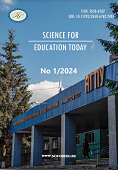Исследование возможностей глобальной цифровой среды для институционального и самостоятельного ознакомления с культурно-концептной информацией
Research into the capacities of the global digital environment for obtaining cultural and conceptual information at institutional and individual levels
Author(s): Alexander Nikolaevich Shamov, Nataliia Evgenjevna Merkish, Olga Vjatcheslavovna PrintsipalovaSubject(s): Education, Foreign languages learning, Higher Education , ICT Information and Communications Technologies, Sociology of Education, Pedagogy
Published by: Новосибирский государственный педагогический университет
Keywords: Global digital environment; Information resource; Concept of German linguistic culture; Cultural-conceptual information; Teaching a foreign language; Teaching a foreign language culture;
Summary/Abstract: Introduction. The article examines the problem of using the global digital environment as a resource of information about the concepts of German linguistic culture. The purpose of the article is to study the functions of the digital environment, identify its capacities for institutional and individual familiarization with cultural-conceptual information, justify the criteria for selecting media texts, and summarize recommendations for using the environment as a source of information about linguistic concepts. Materials and Methods. The study of the digital environment was conducted during two semesters in 12 groups of undergraduates studying German at MGIMO University of the Russian Foreign Ministry. During the research, the following methods were used: survey and study of written and oral statements of students in the process of their immersion into the digital environment, analysis and systematization of the accumulated experience in teaching the concepts of German culture. Results. The article summarizes the experience of researching the global digital environment as a resource of cultural and conceptual information. The functions of the environment used in teaching a foreign language are determined: informational, educational, motivational, and diagnostic. The prospects for institutional and independent familiarization with information about key concepts of culture are identified. The criteria for selecting media texts used as a resource of cultural-conceptual information are substantiated: the availability of data on the concepts being studied, compliance with the value guidelines of Russian society, relevance and novelty of materials, matching with the level of foreign language proficiency of international relations students. Conclusions. The authors have revealed the capacities of the digital environment for obtaining cultural and conceptual information at institutional and individual levels. Implementing the research provisions in teaching practice will contribute to the effective use of the virtual cultural and linguistic space and improve the quality of language and professional preparation of international relations professionals.
Journal: Science for Education Today
- Issue Year: 14/2024
- Issue No: 1
- Page Range: 168-183
- Page Count: 16
- Language: Russian

